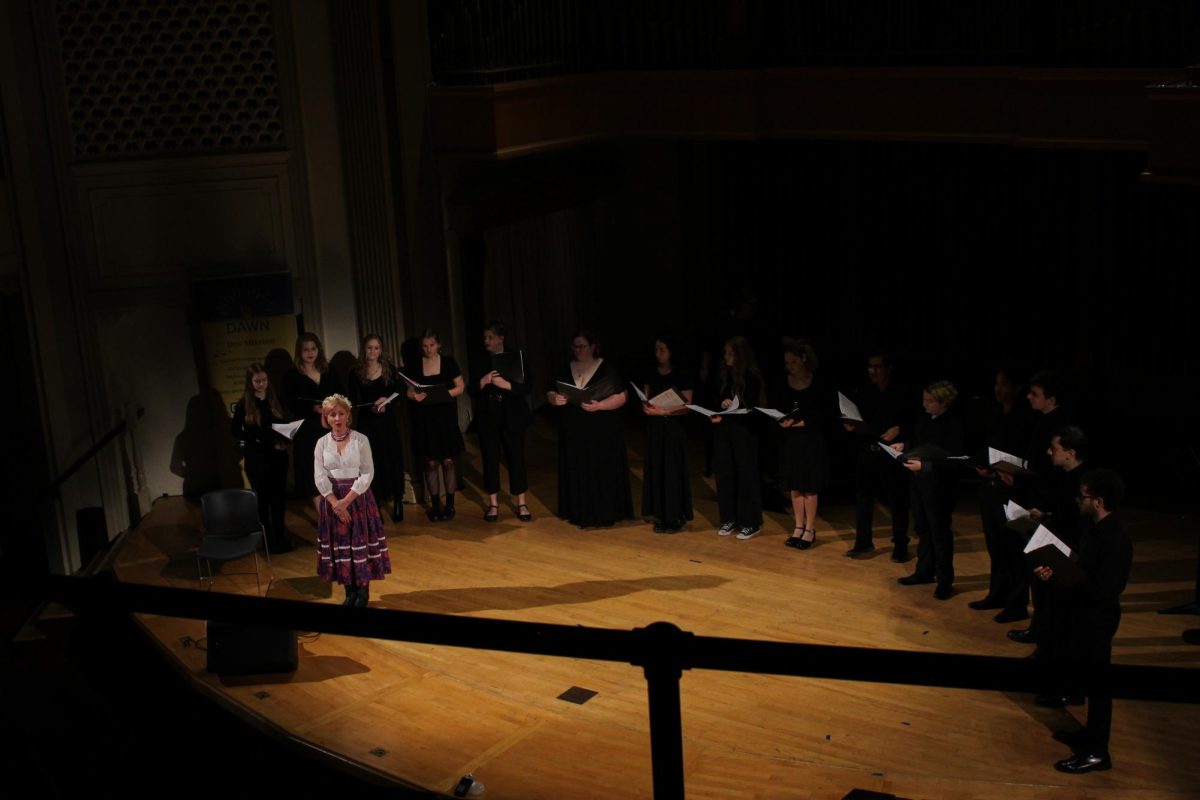Kelley Hungerford
Features editor
“It seems weird talking about investigative journalism in a town that seems so content,” Steve Weinberg, former executive director of Investigative Reporters and Editors, Inc., said during his speech in the Pioneer Reading Room on April 23.
An audience filled the reading room, giving the intimate setting a comfortable and welcoming atmosphere.
Formatted closer to a discussion than a lecture, Weinberg’s speech, titled “Why You Need Investigative Journalism, Even If You Don’t Know You Need It,” covered investigative journalism, its history, its accomplishments and its necessity for a democratic society.
Weinberg, who still edits and contributes to IRE publications, said there are several defining characteristics for investigative reporting, including information gathering skills, patience and relentless curiosity.
“You have to have a certain drive to want to make the world a better place,” he said. “I say I have a constant outrage, but I like to call it a controlled outrage.”
The friendly and fidgety investigative reporter displayed his relentless curiosity during his time at Linfield.
Constantly pacing and only passing behind the lectern to travel across the room, Weinberg asked his audience at the speech almost as many questions as it asked him.
Within the past two days, Weinberg has also visited five mass communication classes and spoken to every student, inquiring, at the very least, where he or she is from and what his or her major is.
“He’s been very generous with his time here, and I’m really impressed with that,” Lisa Weidman, assistant professor of mass communication, said.
Weinberg visited Weidman’s Introduction to Mass Communication class to talk about book publishing.
Weidman said she was impressed with the way he personalized questions while sharing a lot of information. Her students, she said, were attentive and responded audibly when he mentioned that he has written and published eight books.
“He’s so disarming,” she said. “He makes you feel comfortable in his presence with the way he interacts.”
Weinberg also visited Associate Professor of Mass Communication and Department Chair Brad Thompson’s Information Gathering class to speak about journalistic research methods and how they are changing.
Sophomore Jordan Jacobo, a member of the course, said it was interesting to hear what Weinberg had to say about advances in technology that make it more difficult, in some cases, to gather information. He also commented on the importance of investigative journalism.
“As journalists, I think we should realize the foundation of the industry was based on investigative reporting,” Jacobo said. “I think that journalism today is becoming increasingly superficial and the media is shying away from doing so much investigative reporting because it’s more expensive for them to find [the information].”
Weinberg was one of Thompson’s journalism professors in graduate school at the Missouri School of Journalism, where Weinberg still teaches part-time.
When he saw one of Weinberg’s investigative articles about wrongful convictions in the criminal justice system, Thompson decided to invite him to speak at Linfield.
Weinberg writes freelance feature articles for magazines and other media, and his books include biographies, books about journalism and, most recently, a history about investigative journalist Ida Tarbell’s role in deposing John D. Rockefeller’s monopoly in the oil industry during the early 1900s.
For his next book, Weinberg said he would like to write about problems in the criminal justice system, which is his current focus.
At the Missouri School of Journalism, he works with journalism, law and criminal justice students to help release people who are believed to be innocent prisoners through an organization called the Western Innocence Project.
“It’s frustrating because the criminal justice system doesn’t respond well, but it is rewarding,” he said.
Both Weinberg and Thompson said they hope the audience at the speech acquired an understanding of the importance of journalism to an informed electorate and a proper-functioning democracy.
“I am going to hope that I can convey the importance of what investigative journalism is all about,” Weinberg said. “And that people will, by understanding the value of that, continue to support it, buying magazines and buying books and buying newspapers instead of turning on the computer.”
People are becoming
seduced by online content, Weinberg said, but the Internet is not always a reliable source of information.
Weinberg said he knew in junior high school that he wanted to write professionally, and started writing for newspapers after graduating from the Missouri School of Journalism. As he continued his career, he said he cultivated a love for in-depth reporting and soon began to write magazine features and books instead because those media allowed more space for developing stories.
Weinberg’s recent freelance work also deals mostly with this — digging into wrongdoings and trying to make the world a better place through writing.






